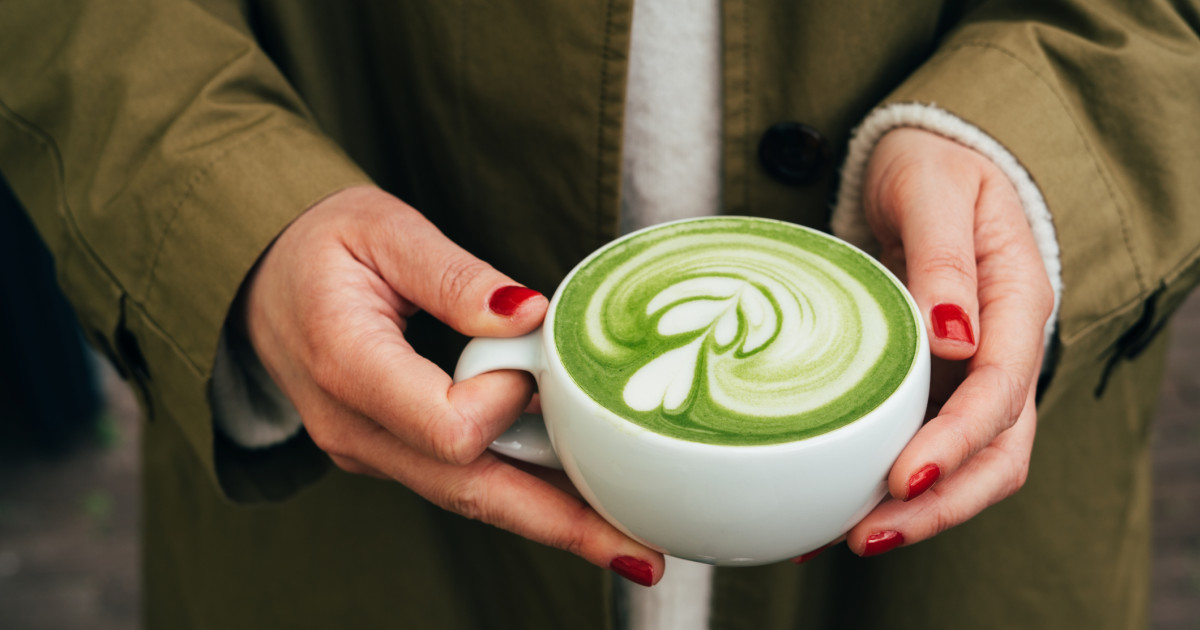Copyright Parade

Key Points Matcha offers antioxidants, caffeine and L-theanine, supporting heart, brain and energy levels. Potential benefits include reduced inflammation, better focus, lower cholesterol and steadier blood sugar. Cautions: may hinder iron absorption, affect sleep, interact with medications or contain contaminants. Matcha looks stunning on social media. The green hue is enough to stand out on a feed, and baristas often get creative, using frothed milk to create leaves, hearts and other shapes. It’s a feast for the eyes, and it looks way different than what’s usually in a teacup. “Generally, when people hear ‘tea,’ they assume the classic tea leaves in a bag, steeped in hot water with the bag eventually removed, leaving behind the subtle flavor of the leaves in the water,” explains Jenny Finke, MS, RDN, a women’s metabolic health dietitian and the owner of The Metabolic Dietitian. “By contrast, matcha is a flavor-packed powder that consists of 100% ground green tea leaves and holds a whole host of health benefits.” What, precisely, are those benefits? She and two other registered dietitians share what happens when you drink matcha every day. They also discuss their favorite ways to enjoy matcha, including how to incorporate it into food. Related: Cold Season Is Coming—Stock up on These 14 Teas To Ease Symptoms and Get Better Faster Matcha Nutrition & Fast Facts Finke explains that matcha originated in Japan, where people harvested the tea for centuries and continues to play a role in tea ceremonies. Yet, it’s gained favor globally, including in the U.S. “Matcha is a powder made from finely-milled green tea leaves, typically consumed as a tea or eaten within foods as a flavor or color enhancer,” she says. “Many people enjoy matcha because of its fresh, floral and toasted umami notes, often describing it to have a similar taste to the smell of fresh-cut grass. The mouthfeel of matcha tea is creamy, and the flavors are complex and well-rounded.” Are the health benefits as well-rounded? Here’s what you get nutritionally when you consume matcha: Calories: 3 Protein: 1 gram Fat: 0 grams Carbohydrates: 0 grams Total Sugars: 0 grams Fiber: 1 gram That…doesn’t look like much? Don’t be fooled by the nutrition label, though. “Pure, unsweetened matcha does not really provide any calories, protein, fiber or healthy fats per serving,” explains Courtney Pelitera, MS, RD, CNSC, a registered dietitian at Live it Up. “Matcha is high in antioxidants, caffeine, amino acids and polyphenols.” Let’s dig into those details, shall we? Related: I’m a Registered Dietitian—Here’s Every Single Thing I Do To Make Sure I Get Enough Protein What Happens When You Drink Matcha Every Day? Matcha is packed with antioxidants, amino acids and polyphenols that can support your heart, blood sugar management and exercise goals. The light caffeine could give you an energy boost without the jitters of a second cup of coffee. Registered dietitians shared more on the benefits of drinking matcha daily. 1. You’ll reduce inflammation Drinking matcha regularly can increase your antioxidant intake, potentially reducing inflammation in the body. “Matcha is well known for being one of the most antioxidant-rich foods you can have,” explains Dr. Chris Mohr, Ph.D., RD, a fitness and nutrition advisor at Garage Gym Reviews. “This is mainly because of catechins, which help protect cells from damage and inflammation.” 🩺SIGN UP for Parade’s health newsletter with expert-approved tips, healthy eats, exercises, news & more to help you stay healthy & feel your best self💊 2. You’ll feel energized (but not on edge) If you’re slumping at 3 p.m., matcha tea may be a better alternative to a third cup of coffee, especially if a good night’s sleep doesn’t always come easily to you. “Most people want to avoid high amounts of caffeine in the afternoon,” Pelitera notes. “A cup of coffee can be enough to disrupt sleep. Matcha provides about half the amount of caffeine as a cup of coffee and may be a good solution for those looking for a little boost without high amounts of caffeine.” 3. You’ll gain focus The caffeine in matcha might help with more than zapping an energy vampire at 3 p.m. You may also find that you can deeply focus on your work after sipping matcha. In addition to caffeine, matcha contains the amino acid known as L-theanine. The two are an all-star tag team for mental clarity. “Studies show that when caffeine and L-theanine are paired together, they help people concentrate and stay focused without the crash or jitters that many often associate with coffee,” Finke says, adding that she recommends it to clients for mid-morning brain fog. 4. You might improve cholesterol Finke shares that studies suggest that antioxidants like the catechins have a modest effect on lowering someone’s LDL (“bad”) cholesterol. “However, over time, these changes can add up, in addition to other cholesterol-lowering diet and lifestyle changes,” she says. “It’s important to know that while daily matcha consumption can play a beneficial role in lowering LDL cholesterol, it should only be a small piece of a heart-healthy lifestyle.” Related: Want to Lower Your Cholesterol and Improve Heart Health? Tea Can Help—Here Are the Best Types to Stock Up On 5. You could reap blood pressure benefits Your heart may love matcha as much as your taste buds for another reason: Improving blood pressure. “Studies show that the natural plant compounds in green tea, especially the catechins, can help slightly lower blood pressure and support healthier blood vessel function over time,” Finke explains. As with the changes, they are modest, but every little bit counts. Combining matcha with other lifestyle tweaks, such as exercise, stress management and dietary tweaks, can work in your favor. 6. You’ll inch closer to blood sugar management Finke points to data from studies suggesting that green tea can lower fasting blood sugar numbers. “This means matcha can support steady and sustained energy with fewer glucose spikes,” she says. “Matcha can be an easy and delicious daily habit when it comes to improving blood sugar control in addition to a balanced diet. It’s not a quick fix, but for many people struggling with energy dips or cravings, adding matcha is one small change that can make the day a little easier.” 7. You’ll supercharge your workout goals “Matcha can be a game-changer for some people by increasing exercise output and improving post-workout recovery,” Finke shares. Once again, she points to catechins, which combine with caffeine to help your body potentially burn more fat during workouts and improve how your muscles use oxygen. Related: Here’s What Exactly Happens to Your Body When You Drink Herbal Tea Every Day 8. You may get a mood boost Matcha may help soothe stress. “The L-theanine in matcha promotes a calm, focused state by increasing alpha brain waves, which are linked to relaxation and mental clarity,” Dr. Mohr shares. 9. You might sleep better Poor sleep doesn’t do your mental health any favors, either. Finke notes that recent research suggests that adults experiencing mild cognitive decline improved their sleep quality and emotional well-being after drinking matcha for a year. “Researchers think this may be due to matcha’s natural balance of L-theanine, gentle caffeine, and antioxidants, which can help calm the mind while keeping us mentally alert.” Related: Want To Lower Inflammation? Add This Vegetable to Your Plate, Registered Dietitians Say Precautions When Drinking Matcha Matcha is often safe, but registered dietitians share it’s not for everyone. Matcha can interact with certain medications and, for some, even cause sleep disturbances. Here’s what to know about the safety of drinking matcha. 1. You might not absorb iron as well Finke shares that research in healthy women suggests that drinking green tea reduces how much iron they absorb. However, women who waited an hour after eating saw better iron absorption. “For those who are at risk of iron-deficiency or consume a majority plant-based diet, I recommend enjoying matcha between meals, or pairing your plant-based meals with a source of vitamin C like citrus, strawberries or bell peppers, as vitamin C is known to boost iron absorption.” 2. You might experience sleep and anxiety issues Matcha contains less caffeine than coffee, but it’s still possible to overdo it or sip it too late in the day. Doing so can affect your mood and sleep. “Drinking matcha late in the day might make it harder to fall asleep or stay asleep, and in any case, too much caffeine can make some people feel restless or anxious,” Finke explains. “My recommendation is to keep matcha to one to two servings on the earlier side of the day to reduce any impacts on having a good night’s sleep.” 3. It could interfere with your medications Matcha could improve cardiovascular health, but be mindful about medications you’re taking for heart conditions (or anything). For instance, Pelitera warns it can interact with statin drugs used to lower cholesterol. “Check with your doctor before consuming to make sure it does not interact with your medication.” 4. You may consume contaminants Some matcha may contain contaminants. “Because the whole leaf is consumed, any pesticides or heavy metals in the plant make their way into the powder,” Dr. Mohr states. “Choosing organic, third-party-tested matcha can help reduce that risk.” Related: The One Common Supplement Combination That Can Actually Weaken Your Bones How To Enjoy Matcha From drinks to ice cream, you’ll scream over these matcha ideas from RDs. The classic way: A tea. Dr. Mohr takes his matcha whisked into hot water. “It’s the cleanest way to taste it,” he says. In smoothies. Blend a different beverage by putting matcha in smoothies like Pelitera. “A smoothie with banana, yogurt, blueberries, almond milk and matcha powder is delicious,” she says. In ice cream. Now we’re talking. “I also enjoy matcha ice cream. It is a little bit less sweet than a typical vanilla ice cream, but the matcha gives it a nice, earthy flavor,” Pelitera dishes. Matcha energy bars. Finke will batch-make protein-packed energy bars with matcha for an “afternoon-pick-me-up” in snack-food form. “The matcha provides me with a slight energy boost in addition to the antioxidants, with their own health benefits,” she says. “These serve as a wonderful pre-workout as well, giving me enough energy to sustain a one-hour strength training session.” Matcha pancakes. Bookmark this one for a festive day! “Especially for holidays like Halloween or Easter, I love to play around with natural food dyes, and the chlorophyll in the matcha is excellent for natural food coloring,” says Finke, who will also make it to bring smiles to friends’ faces. Up Next: Sources:



